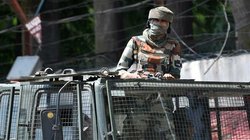 Pakistan has sent another letter to the UN High Commissioner for Human Rights (UNHCHR), demanding intervention to end the "humanitarian crises" in Indian-administered Jammu and Kashmir.
Pakistan has sent another letter to the UN High Commissioner for Human Rights (UNHCHR), demanding intervention to end the "humanitarian crises" in Indian-administered Jammu and Kashmir. RNA - Foreign Minister Shah Mehmood Qureshi has underscored the imperative for the world community, including the UN, to call upon India to rescind its unilateral actions, lift the curfew and other draconian measures and restore fundamental rights of the Kashmiri people, read the statement, Al-Jazeera reported.
Authorities in Srinagar had tightened security ahead of Friday prayers after there were calls for a protest march to a UN office.
Posters appeared overnight this week in Srinagar, in Indian-administered Kashmir, calling for a march to the office of the UN Military Observer Group for India and Pakistan to protest against India's revocation of Jammu and Kashmir state's special autonomy.
More than 150 people have suffered injuries from tear gas and pellets in the disputed Kashmir since Indian security forces launched a major crackdown this month, data from the region's two main hospitals showed.
At least 152 people reported to Srinagar's Shere Kashmir Institute of Medical Sciences (SKIMS) and Shri Maharaj Hari Singh hospital with injuries from pellet shots and tear gas fire between August 5 and August 21, according to data acquired by Reuters news agency.
Reports announced at least 4,000 people have been arrested in Indian-administered Kashmir since August 5, with some of them moved out of the disputed region as jails run out of capacity.
Nearly 200 primary schools were ordered by the authorities to reopen in certain areas. However, attendance in schools remained scant, as many parents decided against sending their children amid heightened tensions in the state.
The Indian government has revoked the special status of Indian-administered Kashmir in its constitution, the most far-reaching political move on the disputed region in nearly 70 years.
A presidential decree issued in early August revoked Article 370 of India's constitution that guaranteed special rights to the Muslim-majority state, including the right to its own constitution and autonomy to make laws on all matters, except defence, communications and foreign affairs.
In the lead-up to the move, India sent thousands of additional troops to the disputed region, imposed a crippling curfew, shut down telecommunications and internet, and arrested political leaders.
The move has worsened the already-heightened tensions with neighbouring Pakistan, which said it would downgrade its diplomatic relations with India.
Islamabad has expelled the Indian ambassador, halted bilateral trade and suspended cross-border transport services.
Pakistani Prime Minister Imran Khan likened the Indian government to Nazi Germany, stating that Hindu-majority India is planning “genocide” against people in the Muslim-majority Kashmir.
Both India and Pakistan claim Kashmir in full but rule it in part. The nuclear-armed neighbours have fought two of their three wars over the disputed territory.
Last Friday, the United Nations Security Council met behind closed doors at the request of China and Pakistan to formally discuss the issue for the first time in 54 years.
847/940